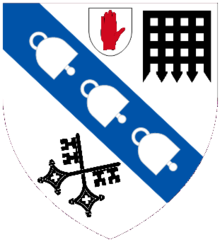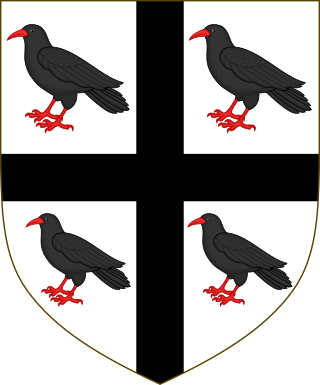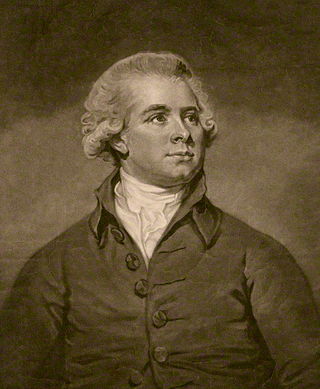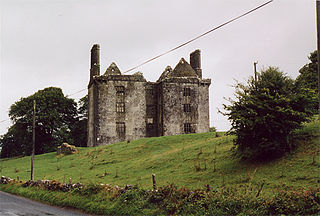Arms
 |
|
The Porter, later Horsbrugh-Porter Baronetcy, of Merrion Square in the City and County of Dublin, is a title in the Baronetage of the United Kingdom. It was created on 24 July 1902 for the Irish lawyer, judge and Liberal politician Andrew Porter. [1] He served as Solicitor-General for Ireland from 1881 to 1882, as Attorney-General for Ireland from 1882 to 1883 and as Master of the Rolls for Ireland from 1883 to 1906. The second Baronet assumed the additional surname of Horsbrugh in 1911.
The heir apparent is the present holder's only son William John Ernest Horsbrugh-Porter (born 2006).
 |
|

Earl of Roden is a title in the Peerage of Ireland. It was created in 1771 for Robert Jocelyn, 2nd Viscount Jocelyn. This branch of the Jocelyn family descends from the 1st Viscount, prominent Irish lawyer and politician Robert Jocelyn, the son of Thomas Jocelyn, third son of Sir Robert Jocelyn, 1st Baronet, of Hyde Hall. He notably served as the Lord Chancellor of Ireland from 1739 to 1756. In 1743, he was raised to the Peerage of Ireland as Baron Newport, of Newport, and in 1755 he was further honoured, when he was made Viscount Jocelyn, also in the Peerage of Ireland. He was succeeded by his son, the second Viscount. He represented Old Leighlin in the Irish House of Commons and served as Auditor-General of Ireland. In 1770 he also succeeded his first cousin once removed as fifth Baronet of Hyde Hall. In 1771 he was created Earl of Roden, of High Roding in the County of Tipperary, in the Peerage of Ireland. Lord Roden married Lady Anne Hamilton, daughter of James Hamilton, 1st Earl of Clanbrassil and sister of James Hamilton, 2nd Earl of Clanbrassil, a title which became extinct in 1798.

Lord Aylmer, Baron of Balrath, in the County of Meath, is a title in the Peerage of Ireland. It was created in 1718 for the naval commander Matthew Aylmer, the second son of Sir Christopher Aylmer, 1st Baronet, of Balrath. Lord Aylmer's son, the second Baron, represented Rye in the House of Commons. The latter's grandson, the fourth Baron, succeeded his kinsman as seventh Baronet, of Balrath, in 1776. The titles remain united. He was succeeded in both titles by his son, the fifth Baron. He was a general in the Army and served as Governor General of Canada from 1830 to 1835. Lord Aylmer assumed by Royal licence the additional surname of Whitworth in 1825 on the death of his uncle Charles Whitworth, 1st Earl Whitworth. On his death, the titles passed to his younger brother, the sixth Baron. He was an admiral in the Royal Navy.

Baron Henniker, of Stratford-upon-Slaney in the County of Wicklow, is a title in the Peerage of Ireland. It was created in 1800 for Sir John Henniker, 2nd Baronet, who had previously represented Sudbury and Dover in the House of Commons. His son, the second Baron, also sat as a Member of Parliament. In 1792 he assumed by Royal licence the additional surname of Major. He was childless and was succeeded by his nephew, the third Baron. He assumed the additional surname of Major by Royal licence in 1822. His son, the fourth Baron, represented Suffolk East in Parliament. In 1866 he was created Baron Hartismere, of Hartismere in the County of Suffolk, in the Peerage of the United Kingdom. This title gave him and his descendants an automatic seat in the House of Lords. He was succeeded by his son, the fifth Baron. He also sat as Member of Parliament for Suffolk East and later held minor office in the Conservative administrations of Benjamin Disraeli and Lord Salisbury. His grandson, the eighth Baron, was a prominent diplomat and notably served as British Ambassador to Jordan and to Denmark. As of 2014 the titles are held by the latter's son, the ninth Baron, who succeeded in 2004.
Baron Huntingfield is a title that has been created three times, twice in the Peerage of England and once in the Peerage of Ireland. The first two creations were by writ, but little more is known about them, except that John de Huntingfield, who was created Baron Huntingfield in 1362, married Margery de Welles, daughter of John de Welles, 4th Baron Welles. John was dead by December 1376, when Margery remarried. Both titles probably became extinct or fell into abeyance on the death of their first holders. The third creation, Baron Huntingfield, of Heveningham Hall in the County of Suffolk, was created in the Peerage of Ireland in 1796 for Sir Joshua Vanneck, 3rd Baronet, Member of Parliament for Dunwich. His son, the second Baron, also represented this constituency in the House of Commons. His great-grandson, the fifth Baron, was Conservative Member of Parliament for Eye and Governor of Victoria. As of 2013 the titles are held by the latter's grandson, the seventh Baron, who succeeded his father in 1994.
There have been four baronetcies created for persons with the surname Clark, all in the Baronetage of the United Kingdom. Two of the creations are extant as of 2010.

There have been two baronetcies created for persons with the surname Burke, both in the Baronetage of Ireland. As of 2014 one creation is extant.
There have been five Baronetcies created for people with the surname Forbes, four in the Baronetage of Nova Scotia and one in the Baronetage of the United Kingdom. The first holder of the Burn Baronetcy of Jessfield, created in the Baronetage of the United Kingdom in 1923, assumed the surname of Forbes-Leith of Fyvie in 1925.
Andrew or Andy Porter may refer to:

There have been three baronetcies created for members of the Blakiston family of Blakiston, County Durham, two in the Baronetage of England and one in the Baronetage of Great Britain. One creation is extant as of 2008.

There have been four baronetcies created for persons with the surname Hope, three in the Baronetage of Nova Scotia and one in the Baronetage of the United Kingdom. As of 2010 one creation is extant, one dormant and two extinct.
There have been nine baronetcies created for persons with the surname Moore, two in the Baronetage of England, one in the Baronetage of Ireland, two in the Baronetage of Great Britain and four in the Baronetage of the United Kingdom. As of 2014 two creations are extant and one is considered dormant.

There have been seventeen baronetcies for persons with the surname Stewart, ten in the Baronetage of Nova Scotia, one in the Baronetage of Ireland and six in the Baronetage of the United Kingdom. See also Steuart baronets, Henderson-Stewart baronets, MacTaggart-Stewart baronets and Stewart-Clark baronets.
There have been two baronetcies created for persons with the surname Porter, both in the Baronetage of the United Kingdom.
There have been three baronetcies created for persons with the surname Noble, all in the Baronetage of the United Kingdom.
There have been four baronetcies created for persons with the surname FitzGerald, one in the Baronetage of Ireland and three in the Baronetage of the United Kingdom.

There have been nine baronetcies created for persons with the surname Cooper, one in the Baronetage of England, one in the Baronetage of Ireland and seven in the Baronetage of the United Kingdom.
The Hort Baronetcy, of Castle Strange in the County of Middlesex, is a title in the Baronetage of Great Britain. It was created on 8 September 1767 for John Hort, Consul-General at Lisbon, Portugal. He was the second son of The Right Reverend Josiah Hort, Archbishop of Tuam. The second Baronet sat as Member of Parliament for Kildare from 1831 to 1832. The third Baronet was a Lieutenant-General in the British Army and fought in the Crimean War. The current Baronet is Sir Andrew Edwin Fenton Hort, of East Prawle, Devon.
Sir Andrew Marshall Porter, 1st Baronet PC, QC was an Irish lawyer and judge.

Sir Andrew Marshall Horsbrugh-Porter, 3rd Baronet, (1907–1986) was a British Army officer and one of the Horsbrugh-Porter Baronets. He was born in 1907 and grew up at Newbay House, Co Wexford, Ireland, the home of the Jefferies family, his maternal grandparents.
The Sheriff of County Dublin was the Sovereign's judicial representative in County Dublin. Initially, an office for a lifetime, assigned by the Sovereign, the Sheriff became an annual appointment following the Provisions of Oxford in 1258. The first recorded Sheriff was Ralph Eure, appointed in that year. The next recorded Sheriff was Sir David de Offington, who was Sheriff in 1282. Besides his judicial importance, the sheriff had ceremonial and administrative functions and executed High Court Writs.